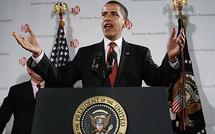Obama holds intense talks with lawmakers on Afghan war
Stephen Collinson
WASHINGTON, Stephen Collinson - US President Barack Obama told top lawmakers Tuesday not to politicize his deliberations on whether to send thousands more troops to Afghanistan, but failed to quell raging debate on the unpopular war.
Obama's meeting with Democratic and Republican power brokers did little to bridge flagrant party divisions over Afghan strategy, and reflected the lonely nature of what will be the most fateful decision of his presidency so far.

"Given the importance of the policy to our security -- and to our troops -- the president said that he will be rigorous and deliberate, while moving forward with a sense of urgency," a senior Obama administration official said.
The president also warned lawmakers not to misrepresent the options -- as Republicans demand swift action on troop deployments and some Democrats campaign openly against escalating the war.
"The president reiterated that we need this debate to be honest and dispense with the straw man argument that this is about either doubling down or leaving Afghanistan," the official said.
Obama must decide whether to meet a request by the military for up to 40,000 more soldiers for a conflict that his commander on the ground, General Stanley McChrystal, has warned could be lost within a year without more men.
Many Democrats oppose adding to the 68,000 US troops who will be in Afghanistan by the end of the year, fearing a long, unpopular war will turn into a quagmire or drain Obama's hopes for a reforming presidency.
Republicans generally want Obama to act fast to send more men, warning failure to do so would endanger US security and invite military defeat.
As a fierce debate flares over war strategy within and between the administration and the military, the president warned his eventual decision would not please everyone in Washington, or in the country, the official said.
High-profile leaders who emerged from the talks in the State Dining Room at the White House all praised Obama for inviting them -- but their comments revealed deep divides over the war pervading Washington.
Republican Senator John McCain warned against one option Obama is thought to be considering -- a focused counterterrorism campaign against Al-Qaeda, rather than a full-scale counterinsurgency approach favored by McChrystal.
"The fact is, we all know if the Taliban comes back, Al-Qaeda will come back," McCain said, drawing parallels between Afghanistan and the under-resourced US effort in Iraq blamed for fanning the insurgency.
"Half measures is what I fear," McCain said, before going on to endorse a troop increase similar to the subsequent troop "surge" strategy that succeeded in Iraq.
"I am very convinced that General McChrystal's analysis is not only correct but should be implemented as quickly as possible."
Democratic Senate Majority leader Harry Reid sought to argue that all the meeting's participants were on the same page.
"Everyone, Democrats and Republicans, said 'whatever decision you make we'll support it basically,'" Reid said.
But Republican Senate leader Mitch McConnell said his party would make up its mind only when the new strategy was clear.
And Eric Cantor, a top Republican in the House of Representatives, said Republicans would only back Obama if he dispatched more troops.
"We were here to express our support for the president and his committing to the mission up front, and expressed our support to work with him if he makes the right decision," Cantor told CNN.
Democratic House Speaker Nancy Pelosi, who earlier warned of grave reservations in her party about escalating the war, also declined to give an undertaking to support Obama's decision.
"There was agreement that it's a difficult decision for the president to make," she told reporters outside the White House.
"Whether we agreed with it or vote for it remains to be seen, when we see what the president puts forth."
---------------------------------------------------------------------------------------------------------------------------------